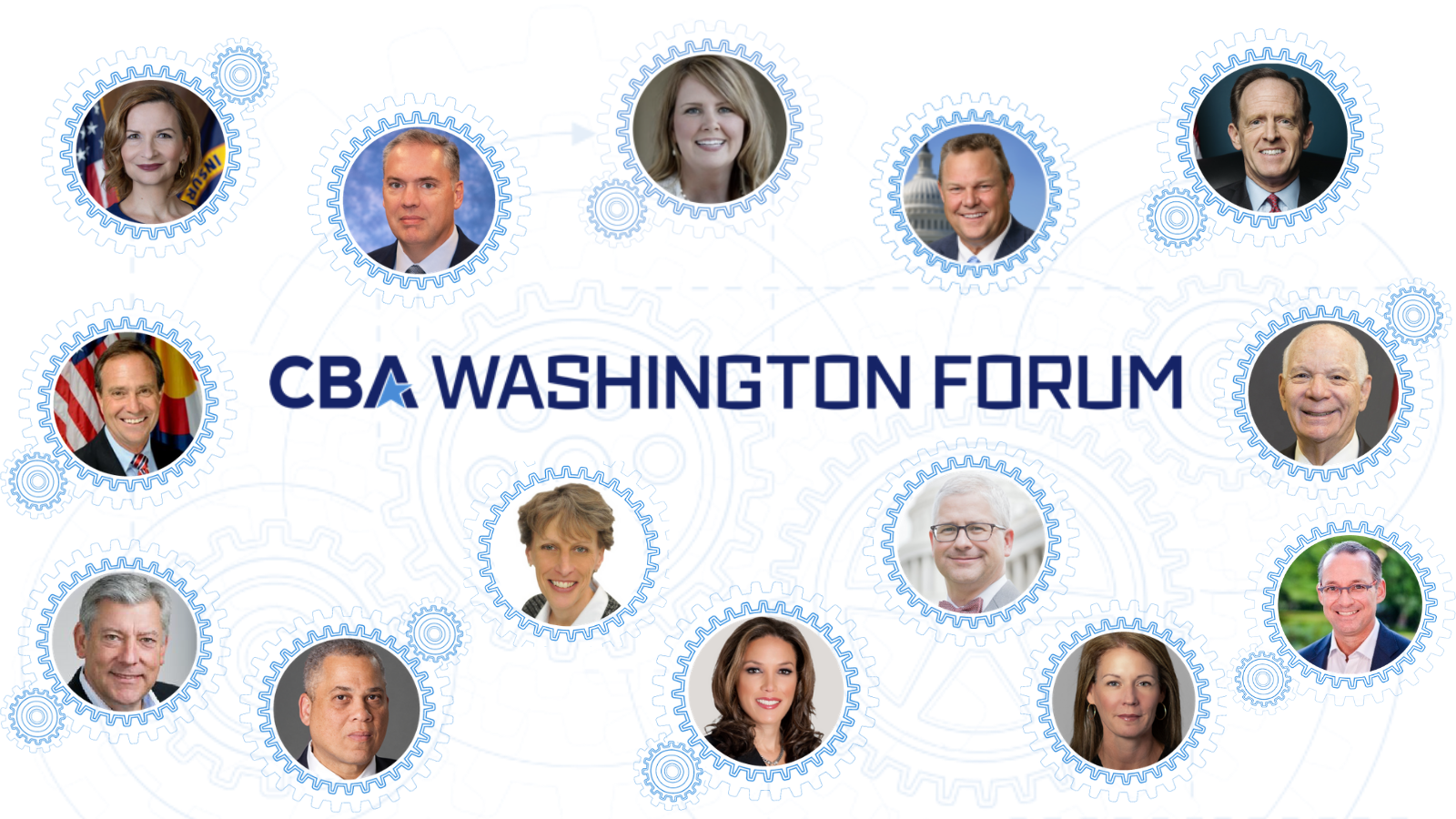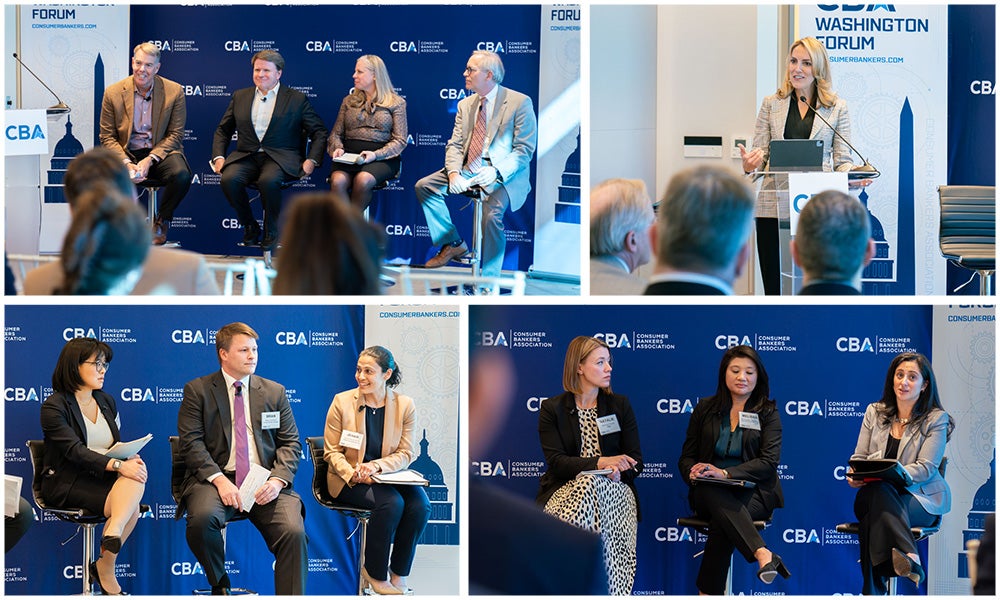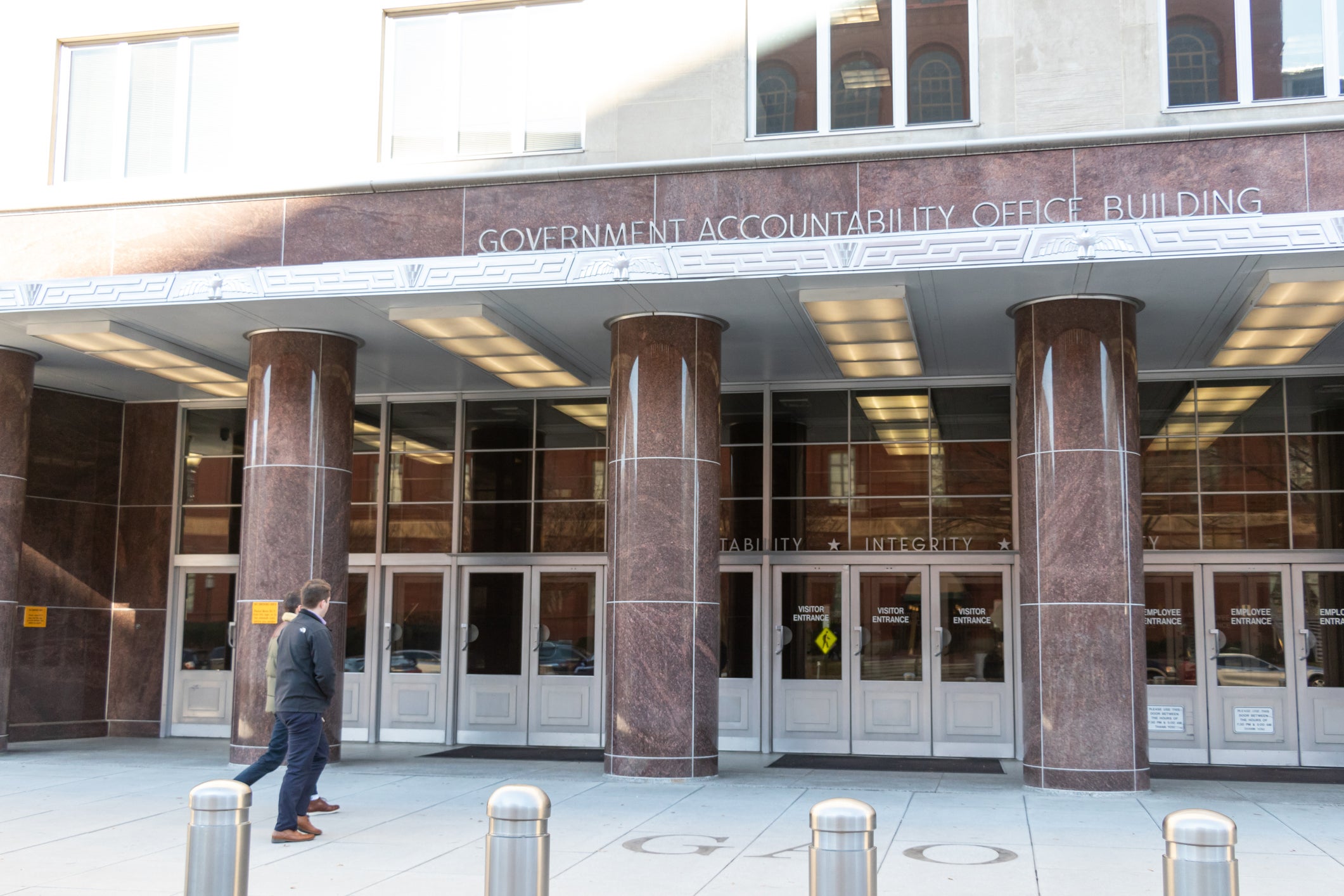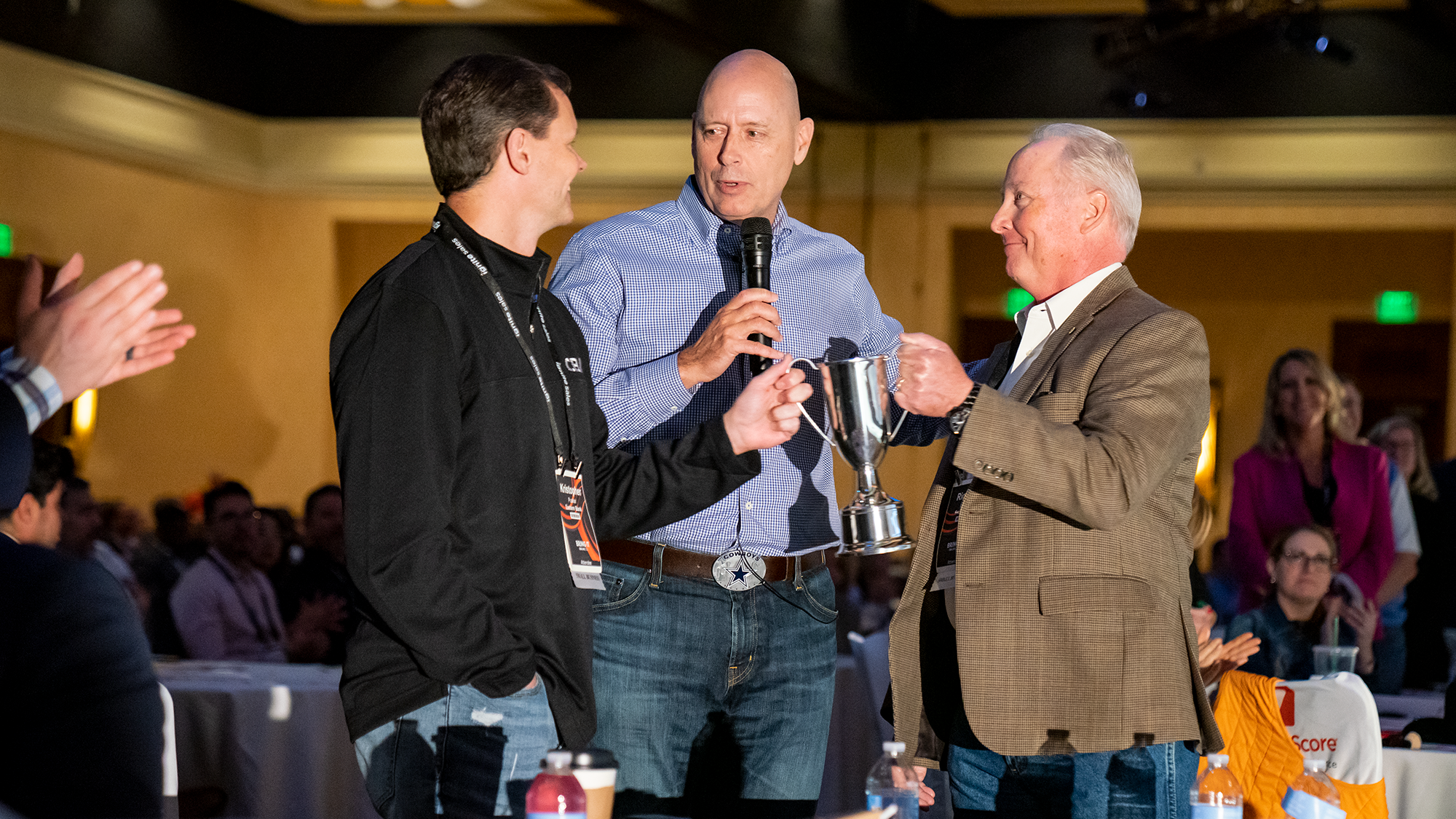At CBA, Lawmakers, Regulators Discuss What’s Ahead in Washington for Retail Banking

At CBA, Lawmakers, Regulators Discuss What’s Ahead in Washington for Retail Banking
At the Consumer Bankers Association’s first-ever Washington Forum earlier today, regulators and lawmakers at the forefront of bank policy weighed in on the biggest issues facing the industry, including: addressing new technologies and the evolving banking ecosystem, increasing access to banking products and services for all Americans, mitigating cyber security threats, advancing diversity, equity, and inclusion, preparing for an aggressive regulatory agenda under a new administration and much more.
During the first two hours of today’s event, CBA bankers and industry leaders heard from:
- Jelena McWilliams, Chairman, Federal Deposit Insurance Corporation (FDIC)
- Blake Paulson, Acting Comptroller, Office of the Comptroller of the Currency (OCC)
- Rep. Patrick McHenry (R-NC), Ranking Member, House Committee on Financial Services
- Sen. Ben Cardin (D-MD), Chairman, Senate Committee on Small Business & Entrepreneurship
- Sen. Pat Toomey (R-PA), Ranking Member, Senate Committee on Banking, Housing & Urban Affairs
- Sen. Jon Tester (D-MT), Member, Senate Committee on Banking, Housing & Urban Affairs
- Rep. Ed Perlmutter (D-CO), Chairman, House Financial Services Subcommittee on Consumer Protection & Financial Institutions
Excerpts from today’s discussions are below. For more information about the event, click here. For video highlights, click here.
On the strength of the American banking system and the role banks played in supporting consumers and small businesses during the pandemic:
Chair McWilliams: “I would say that the number one lesson to take from the pandemic and the, I would say economic shock that it caused was the banks, which it quite well, and that if anything, they served as a vehicle to recovery as they were dispersing funds, including the government stimuli to different communities with their customers.”
Chair McWilliams: “The banks have been remarkably resilient throughout the financial crisis [caused by the pandemic]. I would say that if you take anything away from the last year and the financial crisis, it is that the financial system, the banking system itself has been really resilient with ample liquidity and capital to handle the stress as it did. And if anything, we came out on the other side of that problem, which is almost too much money poured into the banks.”
Acting Comptroller Paulson: “The performance you’ve seen out of banks over the last year during this pandemic is proof that when you start a downturn with a strong banking system, both the economy does better and the banks do better. […] Maintaining a strong, safe and sound banking system is crucial not only to the banks themselves, but the economy.”
Sen. Tester: “On the positive side of the ledger for banks, and there’s a lot on the positive side of the ledger, this pandemic is showing how important […] the local bankers are to their communities. And I would tell you that I am very, very proud about how the banks in Montana have stepped up to help small business access to paycheck protection program. […] It required a lot of work, especially at the beginning when the rules were clear.”
On streamlining the forgiveness process for the Paycheck Protection Program (PPP):
Sen. Cardin: “I want to thank CBA for your work on [streamlining forgiveness]. You showed us the practical problems, particularly of the smaller small businesses and dealing with the bureaucracy of getting the forgivable loan forgiven. […] We intended for those loans to be fully forgivable, under very easy terms for satisfying the use of the funds. But then we found that the SBA, in developing the form for the forgiveness, made it so complicated and so difficult that businesses were lined up for a long period of time and not getting the forgiveness. So, we did take action, thanks to your suggestion for a one page form, particularly for those loans that were smaller in dollar amount so that we could get those forgivenesses done quickly, get them off the books, so that small businesses could get back to doing their business.”
On opportunities for lawmakers to work together on a bipartisan basis:
Sen. Toomey: “Well, it’s no secret. [Congressional Democrats and Republicans] see the world differently. We view the role of banks and financial institutions very, very differently. I have not ruled out the possibility that we could find some common ground in areas like capital formation, possibly even something to do with the GSEs […] And there are some aspects of FinTech that haven’t been polarized politically. So that’s another area where it’s possible, but I'm not going to suggest that we’ve got some major bill that we’re about to unveil that we’ve got to.”
Rep. McHenry: “I think we've got some real opportunities around addressing cybersecurity risk and consumer data privacy. I think those are two areas, well, largely linked, but two areas where we can come to some bipartisan understanding and actually get something enacted into law.”
Rep. Perlmutter: “One of the main priorities that I've had for the last several years, and that would be the Safe Banking Act and the Safe Banking Act, as you may know, involves marijuana and banking. So the purpose is to create a safe harbor for banks and other financial institutions, to provide banking services to legitimate marijuana businesses, those that may actually dispense or sell marijuana. And all the ancillary businesses that the shop owner, the accountant, the lawyer, the insurance company, whatever it may be. […] I’m very confident we have a good bipartisan group of co-sponsors on it now. Hopefully, we’re going to move it very quickly, get it over to the Senate and with Sherrod Brown as the chair of the Banking Committee […] I expect some legislation on marijuana and banking to pass the Congress and be signed by the White House this year.”
On modernizing the Community Reinvestment Act:
Chair McWilliams: “There is always an opportunity to do something on a on a tri-agency basis, interagency basis. We did not give up. We basically ran out of time. When the OCC finalized that rule, we were not in a position to do so because we were frankly dealing with a pandemic and the impact on community banks. I believe they finalized it in late May, early June of last year. And at that point in time, we were still frankly stressed out about what is going on the ground. And we were engaged in what I like to call a regulatory whack a mole. […] I am more than happy to work with the Fed and OCC on ‘coming to the altar together’ and ‘saying I do’ in a tri-fashion. And I do think that there is an opportunity. The Federal Reserve has received over 600 comment letters on their advance notice of proposed rulemaking. We are reviewing those comment letters, as well as I believe OCC is. And, of course, the Fed. And at some point, we will sit back together at the same table and say, is there a path forward for all three of us? And we'll see what the comptroller says at that time. But I'm certainly willing to play ball and make it to the altar if we can come up with a sensible proposal that works for state-member banks, state non-member banks, as well as the national banks.”
On proposals to deploy some sort of public banking option either through the Federal Reserve or the US Postal Service:
Sen. Tester: “I'm not inclined to support those efforts. […] to pull off the post offices or the Federal Reserve banking policies, I don't think it's going to have much legs myself.”
Sen. Toomey: “This is just madness. The idea that the federal government should become a bank is so ridiculous.”
Rep. McHenry: “Expanding Fed accounts into individuals or our businesses is simply not the right approach. In fact, it destroys the banking system that we've developed over the last century and a half here in the United States. And that banking system has brought us more small business growth than the rest of the world. […] Instead, we should be focused on regulatory changes that could help innovation and meet consumer needs and bring down the cost of payments.”
On advancing diversity, equity, and inclusion in the banking industry:
Rep. Perlmutter: “We’re going to have […] in the American Jobs Act, that we're working on right now in the Committee, even as we speak, again, a housing provision, and schools, and a variety of other things to make sure that there’s equity and that minority neighborhoods are really focused upon. And that, in delivering services, financial institutions really consider all their customers. And we I think most do. But we really want to emphasize that to try to avoid any more kind of disadvantages to different ethnic groups and communities in the country.”
On bank consolidation and the role of online banking:
Chair McWilliams: “Branches are very important. You still have especially, I would say, in rural communities. But in a lot of cases, that branch is just about the economic center of Main Street in a small in a small downtown. And so I wouldn't say that online banking will ever replace that personal interaction you have with a customer when they come at your window inside the bank.”
On financial technology companies applying for bank charters:
Acting Comptroller Paulson: “You can be assured that we will be applying a level playing field and we'll be applying OCC style supervision to those entities and ensuring that they're safe and sound and treating their customers fairly.”
On the idea of a company with a large commerce presence such as Amazon or Wal-Mart becoming a charted bank:
Acting Comptroller Paulson: “I honestly haven't seen any real traction yet that would lead me to believe that this idea that we need a separation between banking and commerce will break down any time soon. So, I would say I can't go as far as ever, but at least as far as I can see, I don't see those type of companies having bank charters.”
On fostering innovation and increase access to banking products and services for Americans of all walks of life:
Chair McWilliams: “As you know, fostering innovation has been a top priority for me at the FDIC. […] We would like to support access to the banking system for unbanked households and small businesses. […] I think there's a lot of innovation that can come in [small dollar lending] space to allow consumers that have not been traditionally banked or, frankly, unbanked because they don't have access to as many financial services as they could – there's more we can do in the next couple of years. […] I would like those six or seven million [unbanked] Americans to have banking accounts, checking accounts. I would like them to become a fiber, become a part of the American fiber through financial inclusion and have opportunities available to them. And that's something, frankly, we're working on.”
On what to expect from President Biden’s nominee to lead the CFPB, Rohit Chopra:
Sen. Tester: “And assuming Chopra gets confirmed, it is important that the CFPB is doing the work that they were tasked to do in a way that Congress intended. And so, look, I've got great hopes for incoming director. I think he has the skillset to do a very good job. […] communication is really important and visiting with stakeholders is critically important.”
Sen. Toomey: “Mr. Chopra is a very intelligent and well-informed guy, but again, this is someone who sees the world very differently than I do now. He was part of the original launch and formation and management of the CFPB during a time under Cordray’s leadership, when, if you ask me, the CFPB frequently and routinely exercised powers that did not it did not have under the statute. They were extremely hostile to financial services. […] I'll be honest. I'm worried that Mr. Chopra will take us back to the days of Cordray.”
Rep. McHenry: “[Rohit Chorpa has] made it clear his agenda is about limiting consumer choice, driving up the cost of credit for everyone through restrictive policies and hamstringing job creators through over-regulation. […] [some policymakers are] trying to weaponize the CFPB to go after companies they simply don't like. And that's not the way this is supposed to work.”
On protecting the banking system from cyber security threats:
Chair McWilliams: “What’s important in terms of innovation is for us to engineer resilient system for the future. Every day you hear about cyber hack here or breach there, and you hear about other regimes around the world overtaking the United States in terms of not just the resilience of the system, but innovative ideas, etc. And I think if we combine resilience with innovation, I think there's a lot we can do as a regulatory agency. We are looking at artificial intelligence, digital assets, quantum computing. We're trying to figure out what can be done in this space that's sensible, that responds to our safety and soundness and consumer protection mandates.”
Acting Comptroller Paulson: “The biggest threat to banking is cybersecurity and information security. […] I mean, we really feel a lot better about credit risk in the system today, certainly much better than we thought we would at this point. But the cyber actors out there that are trying to attack banks and other financial systems have not let up at all during the pandemic and in some ways maybe have accelerated.”
Stay tuned for more highlights from Washington Forum later this week.



